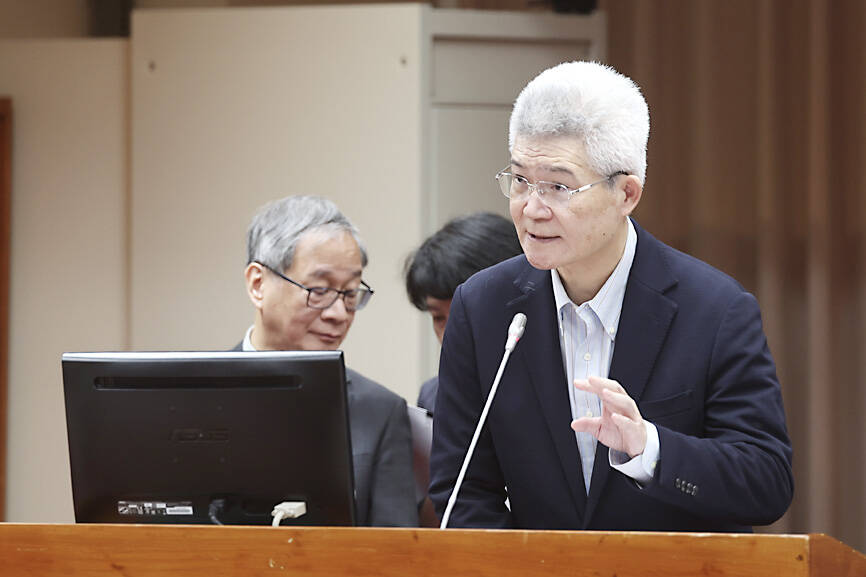Opposition lawmakers yesterday vowed to cut funding for the English-language TaiwanPlus television channel due to controversies over its news coverage, and demanded that the Ministry of Culture conduct a review.
Minister of Culture Li Yuan (李遠) and Public Television Service chairman Hu Yuan-hui (胡元輝) were questioned by Chinese Nationalist Party (KMT) and Taiwan People’s Party (TPP) legislators during a committee meeting on issues relating to the state-financed TaiwanPlus.
Operated by Public Television Service under the ministry’s jurisdiction, TaiwanPlus has been embroiled in several controversies recently.

Photo: CNA
KMT legislators requested that TaiwanPlus remove a news report on the US election describing US president-elect Donald Trump as a “convicted felon,” saying it was inappropriate and biased.
The channel took down the video, while Public Television Service said it would review its operational procedures.
TPP legislators have also criticized TaiwanPlus for using a photograph of TPP Chairman Ko Wen-je (柯文哲) in handcuffs during the segment “Taiwan Corruption Crackdown,” which they said was mainly about reports relating to investigations of Ko.
KMT Legislator Lo Chih-chiang (羅智強) yesterday accused TaiwanPlus of operating as a “state propaganda outlet” on behalf of the Democratic Progressive Party (DPP) government, “helping to whitewash news” and “direct media attention of international communities” in favor of the DPP.
“We shall scrutinize the budgets for Public Television Service and TaiwanPlus and cut their funding as we see fit,” Lo said.
KMT Legislator Hung Meng-kai (洪孟楷) said that TaiwanPlus has cost taxpayers NT$5.8 billion (US$178.21 million), “but the world only heard its biased reporting.”
He also alleged that the channel has low viewership, downloads and subscriptions abroad.
Li said that TaiwanPlus has an annual budget of about NT$800 million and has totaled NT$2.8 billion since its launch three years ago.
The overall budget of NT$5.8 billion included funding for making documentaries and other programs to improve its media services, he said.
“Currently, the results at TaiwanPlus are not yet ideal,” he said. “However, it can be strengthened.”
Li and Hu also defended the Trump report, saying that media in other countries also used “convicted felon” to describe him during the campaign.
DPP caucus chief executive Rosalia Wu (吳思瑤) said that Taiwan has fought hard to remove central government, military or political party control over media, “yet the KMT and TPP are now interfering in freedom of expression and media independence by seeking to repress news reports they object to.”

A preclearance service to facilitate entry for people traveling to select airports in Japan would be available from Thursday next week to Feb. 25 at Taiwan Taoyuan International Airport, Taoyuan International Airport Corp (TIAC) said on Tuesday. The service was first made available to Taiwanese travelers throughout the winter vacation of 2024 and during the Lunar New Year holiday. In addition to flights to the Japanese cities of Hakodate, Asahikawa, Akita, Sendai, Niigata, Okayama, Takamatsu, Kumamoto and Kagoshima, the service would be available to travelers to Kobe and Oita. The service can be accessed by passengers of 15 flight routes operated by

MORE FALL: An investigation into one of Xi’s key cronies, part of a broader ‘anti-corruption’ drive, indicates that he might have a deep distrust in the military, an expert said China’s latest military purge underscores systemic risks in its shift from collective leadership to sole rule under Chinese President Xi Jinping (習近平), and could disrupt its chain of command and military capabilities, a national security official said yesterday. If decisionmaking within the Chinese Communist Party has become “irrational” under one-man rule, the Taiwan Strait and the regional situation must be approached with extreme caution, given unforeseen risks, they added. The anonymous official made the remarks as China’s Central Military Commission Vice Chairman Zhang Youxia (張又俠) and Joint Staff Department Chief of Staff Liu Zhenli (劉振立) were reportedly being investigated for suspected “serious

ENHANCING EFFICIENCY: The apron can accommodate 16 airplanes overnight at Taoyuan airport while work on the third runway continues, the transport minister said A new temporary overnight parking apron at Taiwan Taoyuan International Airport is to start operating on Friday next week to boost operational efficiency while the third runway is being constructed, the Ministry of Transportation and Communications said yesterday. The apron — one of the crucial projects in the construction of the third runway — can accommodate 16 aircraft overnight at the nation’s largest international airport, Minister of Transportation and Communications Chen Shih-kai (陳世凱) told reporters while inspecting the new facility yesterday morning. Aside from providing the airport operator with greater flexibility in aircraft parking during the third runway construction,

American climber Alex Honnold is to attempt a free climb of Taipei 101 today at 9am, with traffic closures around the skyscraper. To accommodate the climb attempt and filming, the Taipei Department of Transportation said traffic controls would be enforced around the Taipei 101 area. If weather conditions delay the climb, the restrictions would be pushed back to tomorrow. Traffic controls would be in place today from 7am to 11am around the Taipei 101 area, the department said. Songzhi Road would be fully closed in both directions between Songlian Road and Xinyi Road Sec 5, it said, adding that bidirectional traffic controls would